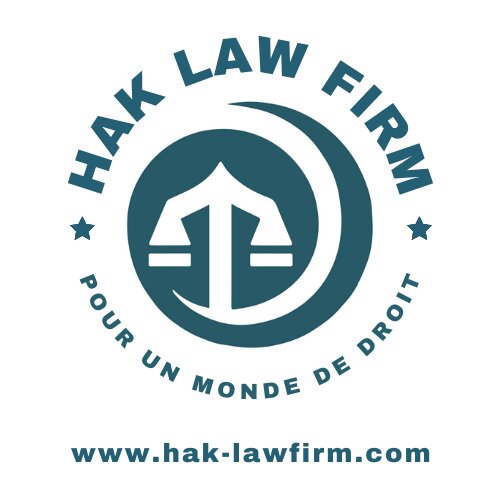Best Wage & Hour Lawyers in DR Congo
Share your needs with us, get contacted by law firms.
Free. Takes 2 min.
Or refine your search by selecting a city:
List of the best lawyers in DR Congo
About Wage & Hour Law in DR Congo
In the Democratic Republic of Congo (DRC), Wage & Hour laws are a crucial aspect of labor legislation. They are designed to ensure fair pay and reasonable working hours for employees. These laws set standards for minimum wage, overtime pay, working hours, and other working conditions. Compliance with these laws is vital for both employers and employees to maintain a fair working environment. The DR Congo's labor laws are periodically updated to adapt to economic changes and to protect workers' rights effectively.
Why You May Need a Lawyer
There are several situations where seeking legal advice in Wage & Hour matters may be necessary:
- If you are an employee who has not been paid according to the legal minimum wage standards.
- If you are facing unpaid overtime or workplace exploitation.
- If you are an employer facing disputes regarding wage and working hours with your employees.
- If you need assistance in understanding and complying with the complexities of the local labor laws.
- If you want to file a complaint against an employer for violation of Wage & Hour laws.
Legal expertise is critical to navigating these scenarios effectively and ensuring that your rights or business interests are protected.
Local Laws Overview
The DRC's Wage & Hour laws cover several essential components:
- Minimum Wage: The country has set minimum wage standards, which vary depending on the industry and nature of employment. Employers must adhere to these standards.
- Working Hours: Typically, the legal working hours are capped at 48 hours per week, and anything beyond that is considered overtime, which should be compensated accordingly.
- Overtime Compensation: Overtime pay is required at a rate higher than the regular hourly wage, ensuring that workers are fairly remunerated for additional working hours.
- Leave Policies: Labor laws dictate mandatory leave provisions, including annual leave, maternity leave, and sick leave.
- Employment Contracts: Clear guidelines are outlined on how employment contracts should be structured, ensuring transparency and fairness in employee-employer relationships.
Frequently Asked Questions
1. What is the current minimum wage in DR Congo?
The minimum wage rates in DR Congo vary by sector and type of employment. It's essential to check the latest rates as they are subject to change periodically.
2. How are overtime hours compensated in DR Congo?
Overtime must be paid at a premium rate, which is typically higher than the regular hourly wage. Employers need to ensure compliance with these regulations.
3. What are the standard legal working hours per week?
The standard legal working hours are 48 hours per week. Any time worked beyond this limit is considered overtime.
4. Are there specific laws for domestic workers?
Yes, domestic workers in DR Congo are protected under specific regulations that outline their pay, working conditions, and rights.
5. What should I do if my employer refuses to pay the minimum wage?
If you are not paid the minimum wage, you have the right to file a complaint with the relevant labor authorities or seek legal advice for further action.
6. Can my employer reduce my wage without notice?
No, employers are required to provide notice and have valid reasons for any wage reduction. Such actions must comply with labor laws.
7. Do I have the right to paid maternity leave?
Yes, female employees are entitled to paid maternity leave. The duration and compensation should align with the legal requirements.
8. How are disputes between employers and employees resolved?
Disputes can be resolved through negotiation, mediation, or legal proceedings, depending on the complexity of the issue.
9. Is there a provision for annual leave?
Yes, employees are entitled to annual leave, which is typically stipulated in employment contracts according to legal guidelines.
10. What steps should I take if my working hours are unreasonable?
If your working hours exceed the legal limits, you should discuss the issue with your employer and seek resolution. Legal advice may be necessary if the issue persists.
Additional Resources
For additional information and support, consider reaching out to the following resources:
- Ministry of Employment, Labor, and Social Welfare: The government body responsible for enforcing labor laws and handling disputes.
- Labor Unions: Organizations that can provide support, advocacy, and guidance to workers regarding wage and hour concerns.
- Non-Governmental Organizations: Various NGOs in DR Congo focus on workers' rights and can offer advice and assistance in wage and hour matters.
Next Steps
If you require legal assistance regarding Wage & Hour issues, consider taking the following steps:
- Gather all relevant documents and evidence related to your employment and wage disputes.
- Contact a lawyer specializing in labor law to discuss your case and seek professional advice.
- If applicable, file a complaint with the Ministry of Employment, Labor, and Social Welfare.
- Engage with local labor unions or worker advocacy groups for support and guidance.
By taking these steps, you can better navigate the complexities of Wage & Hour laws in DR Congo and ensure that your rights or business interests are protected.
Lawzana helps you find the best lawyers and law firms in DR Congo through a curated and pre-screened list of qualified legal professionals. Our platform offers rankings and detailed profiles of attorneys and law firms, allowing you to compare based on practice areas, including Wage & Hour, experience, and client feedback.
Each profile includes a description of the firm's areas of practice, client reviews, team members and partners, year of establishment, spoken languages, office locations, contact information, social media presence, and any published articles or resources. Most firms on our platform speak English and are experienced in both local and international legal matters.
Get a quote from top-rated law firms in DR Congo — quickly, securely, and without unnecessary hassle.
Disclaimer:
The information provided on this page is for general informational purposes only and does not constitute legal advice. While we strive to ensure the accuracy and relevance of the content, legal information may change over time, and interpretations of the law can vary. You should always consult with a qualified legal professional for advice specific to your situation.
We disclaim all liability for actions taken or not taken based on the content of this page. If you believe any information is incorrect or outdated, please contact us, and we will review and update it where appropriate.
Browse wage & hour law firms by city in DR Congo
Refine your search by selecting a city.
















